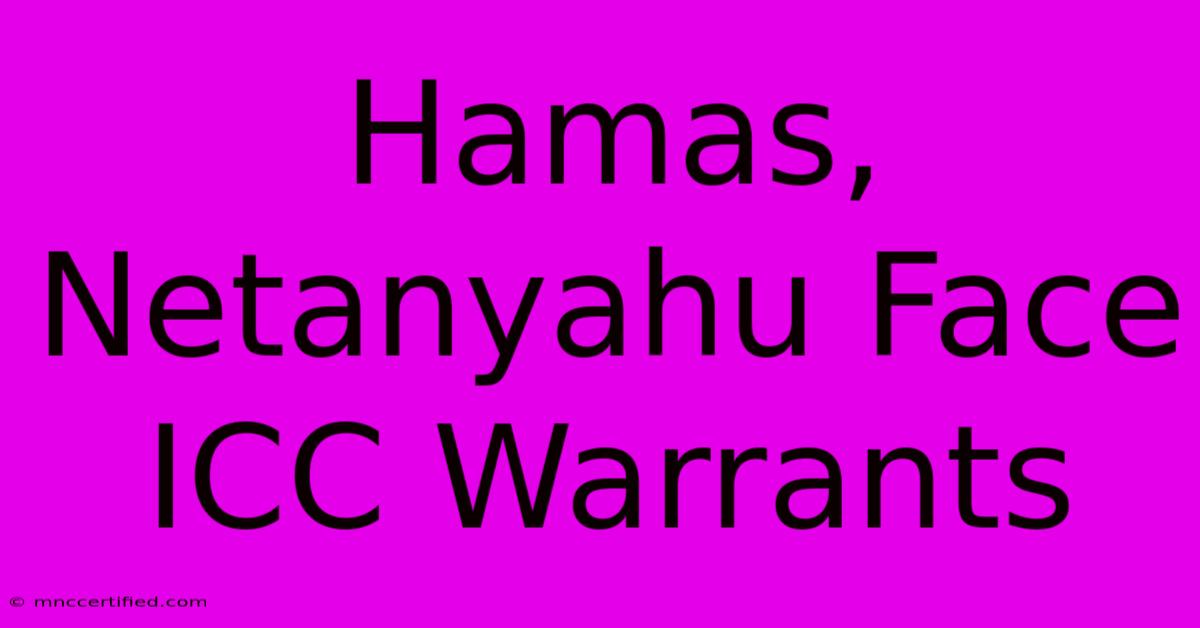Hamas, Netanyahu Face ICC Warrants

Table of Contents
Hamas, Netanyahu Face ICC Warrants: A Deep Dive into the International Criminal Court's Investigations
The International Criminal Court (ICC) has issued arrest warrants for both Hamas leaders and Israeli Prime Minister Benjamin Netanyahu, marking a significant escalation in the ongoing Israeli-Palestinian conflict. This unprecedented development has ignited a firestorm of international debate, raising complex questions about international law, justice, and the future of peace in the region. This article will delve into the details of the ICC investigations, exploring the accusations, the legal complexities, and the potential implications of these warrants.
Understanding the ICC's Jurisdiction
The ICC's jurisdiction is rooted in the Rome Statute, an international treaty establishing the court. It primarily prosecutes individuals for war crimes, crimes against humanity, and genocide. Crucially, the Court's jurisdiction is limited; it can only investigate and prosecute crimes committed on the territory of a state party to the Rome Statute or by a national of a state party. Neither Israel nor Palestine is a full member state of the ICC. However, the situation is more nuanced.
Palestine's Accession and Israel's Non-Cooperation
Palestine's acceptance of the Rome Statute's jurisdiction in 2014 forms the basis for the ICC's investigation into alleged crimes committed in the Palestinian Territories. Israel, on the other hand, rejects the ICC's jurisdiction and refuses to cooperate with the investigations. This non-cooperation significantly hampers the Court's ability to gather evidence and prosecute effectively.
The Accusations Against Hamas
The ICC's investigation into Hamas focuses on alleged war crimes committed during the 2014 Gaza conflict and potentially other periods of conflict. The accusations include:
- Targeting of civilians: Allegations of indiscriminate attacks and the use of human shields.
- Use of prohibited weapons: Accusations involving the use of weapons that may violate international humanitarian law.
- Unlawful killings: Claims of extrajudicial executions and unlawful killings of civilians.
It is crucial to note that these are accusations, and Hamas has vehemently denied all charges. The ICC's investigation aims to establish the facts and determine whether these accusations are supported by sufficient evidence.
The Accusations Against Netanyahu
The ICC's investigation into Israeli actions, and specifically, Netanyahu's potential culpability, stems from similar accusations, focusing on actions during the 2014 Gaza conflict and potentially other operations in the occupied Palestinian territories. The accusations center around:
- War crimes: Allegations of disproportionate attacks causing unnecessary civilian casualties.
- Crimes against humanity: Possible accusations of widespread or systematic attacks against civilians.
- Settlements: The ICC has expressed interest in potential links between the expansion of Israeli settlements and alleged crimes against humanity.
The accusations against Netanyahu, similar to those against Hamas, are currently under investigation. The ICC's process is rigorous, requiring substantial evidence to support any indictment and subsequent conviction.
Implications and International Reactions
The ICC warrants have ignited a firestorm of international reactions. Israel has condemned the investigations as biased and politically motivated, vowing non-cooperation. Conversely, Palestine views the warrants as a crucial step toward accountability. Many other nations have expressed varying degrees of support or concern, highlighting the deeply divisive nature of the issue.
The long-term implications remain uncertain. The ICC's ability to successfully prosecute these cases hinges on various factors, including access to evidence, witness cooperation, and potential political interference. The warrants, however, represent a significant turning point, signifying a possible shift towards holding powerful leaders accountable for alleged atrocities.
Conclusion: The Path to Justice Remains Uncertain
The ICC warrants against both Hamas and Netanyahu mark a watershed moment in the Israeli-Palestinian conflict. The path towards justice remains long and fraught with complexities. While the warrants signify a commitment to accountability under international law, their ultimate impact depends on the Court's ability to navigate political pressures and gather sufficient evidence to support convictions. The investigations will undoubtedly continue to dominate international headlines for years to come, shaping the future trajectory of the conflict and the role of international law in addressing alleged war crimes.

Thank you for visiting our website wich cover about Hamas, Netanyahu Face ICC Warrants. We hope the information provided has been useful to you. Feel free to contact us if you have any questions or need further assistance. See you next time and dont miss to bookmark.
Featured Posts
-
Jones Practices Safety After Giants Cut
Nov 22, 2024
-
John Prescott Angela Rayners Precursor
Nov 22, 2024
-
Nations Top Recruit New College Home
Nov 22, 2024
-
Rooney Seen After Coleens I M A Celeb Entry
Nov 22, 2024
-
Adani Bribery Modis India Impacted
Nov 22, 2024